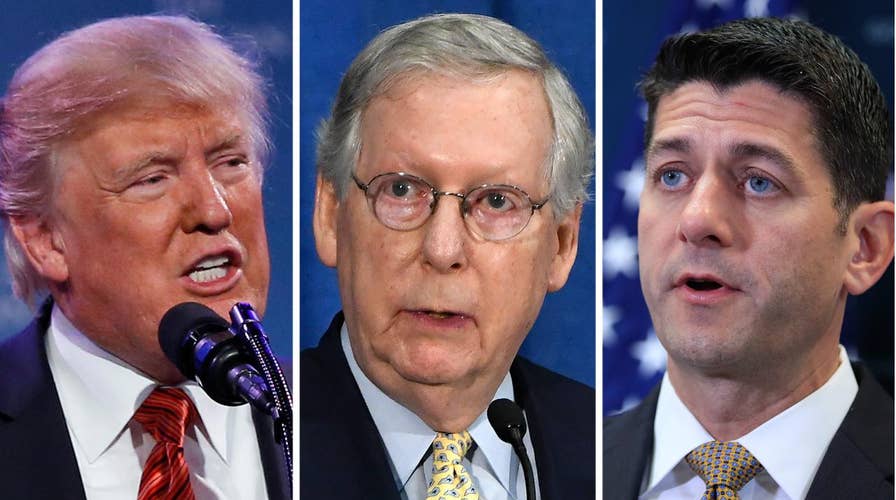Trump blames McConnell, Ryan for looming debt ceiling battle
GOP heading for self-inflicted wound? Reaction from 'Fox News Sunday' anchor Chris Wallace
Congress returns next week facing several looming challenges leading with President Trump’s call to strike an infrastructure deal promptly, and agreeing to a temporary spending deal to avoid a government shutdown.
Other key issues facing the GOP-controlled Congress include immigration reform and whether to fund Trump’s promised U.S.-Mexico border wall.
Trump is scheduled to meet early next week with Senate Majority Leader Mitch McConnell, R-Ky., and House Speaker Paul Ryan, R-Wis., to set legislative priorities on Capitol Hill. But few if any major initiatives are likely to pass without Democratic support, especially in the Senate where Republicans now have just a 51-49 majority.
To be sure, Trump has made clear that he wants Congress to pass a trillion-dollar spending bill to fix the country’s crumbing roads, bridges, ports and other infrastructure.
Political analysts predicted Trump would try to broker an infrastructure deal at the start of his presidency, considering the idea, which would result in at least some short-term jobs, appeared to have bipartisan support.
However, at least some congressional Republicans seemed unwilling to spend at least $1 trillion on such an initiative. And the situation now appears further complicated by the recently passed, GOP-led tax reform bill that is projected to add roughly $1.5 trillion to the federal debt over the next 10 years.
“Infrastructure is by far the easiest” of Trump's priorities, the president said a couple of weeks ago, after signing into law the tax reform bill. “People want it -- Republicans and Democrats. We're going to have tremendous Democrat support on infrastructure as you know. I could've started with infrastructure -- I actually wanted to save the easy one for the one down the road. So we'll be having that done pretty quickly.”
The White House reportedly is working on a roughly 70-page infrastructure proposal to be released in the coming weeks.
Meanwhile, agreeing to another temporary spending bill by January 19 to avoid a government shutdown is seen as Congress’ most immediate concern.
The media routinely play up the drama of a potential standoff resulting in a shutdown. But that situation has been avoided since 2013, considering how politically disastrous it could be for either party, especially in a midterm election year such as 2018.
Still, a demand by Trump to include border wall funding or Democrats’ demanding a fix to the soon-to-expire Deferred Action for Childhood Arrivals program easily could complicate budget negotiations.
Trump earlier this year shuttered the Obama-era DACA program that protected millions of young illegal immigrants from deportation. The program officially expires in March. Trump also has signaled his desire for a permanent, congressionally-approved fix, as have Capitol Hill Democrats and many Republicans.
However, the related partisan horse trading -- including possible attempts to package the legislation with other initiatives -- could turn into a sticking point.
Trump and other top officials publicly have gone back and forth on whether funding to complete the border wall must be included in any spending or immigration deal.
Marc Short, the White House director of legislative affairs, recently told “Fox News Sunday” that Trump still intends to fulfill his campaign promise to build the wall, as part of an overall national security plan. But Short also suggested the president wouldn’t insist on wall funding at the expense of larger U.S. interests, with the potential government shutdown looming.
“It’s absolutely something the president has promised,” he said. “It’s not that it’s non-negotiable; It’s what American needs. It’s in our national security interest to prevent drug cartels, to prevent MS-13 and secure our border.”
However, Trump on Friday tweeted: “The Democrats have been told, and fully understand, that there can be no DACA without the desperately needed WALL at the Southern Border … We must protect our Country at all cost!”
Trump, in the tweet, also made clear that he wants immigration reform to include an end to so-called “chain migration," a part of U.S. immigration law that allows illegal immigrants to bring distant relatives into the country, and the United States’ visa lottery program as it currently exists.
The system, created by Congress, attempts to diversity the mix of immigrants into the U.S. by establishing a lottery for countries from which few immigrants come.
However, Trump says the system is “ridiculous” because some of the included countries are state sponsors of terrorism.
Trump likely will have to shore up his off-and-on-again relationship with Congress’ top two Democrats -- Senate Minority Leader Chuck Schumer of New York and House Minority Leader Nancy Pelosi of California -- if he indeed wants to strike any major deals, particularly on immigration reform.
Meanwhile, Ryan and McConnell appear split on whether Congress will attempt so-called entitlement reform, which could include changes to Social Security, Medicaid, Medicare or food stamps.
Ryan has expressed a desire to address the issue, while McConnell appears to think it would hit a dead end in the Senate.
“I think Democrats are not going to be interested,” McConnell recently said. “I would not expect to see that on the agenda.”
Washington Republicans also appear divided over how to approach special counsel Robert Mueller’s Justice Department investigation into whether Trump associates colluded with Russia during the 2016 elections.
House Intelligence Committee Chairman Devin Nunes, R-Calif., recently blasted the department and the FBI for its “failure to fully produce” documents related to the so-called anti-Trump dossier, which is related to federal probes, while other Republicans suggest such an approach is politically dangerous.
Trump wants the probe to end soon but has dismissed rumors that he will fire Mueller. He told The New York Times several days ago that he thinks Mueller “will be fair.”














































